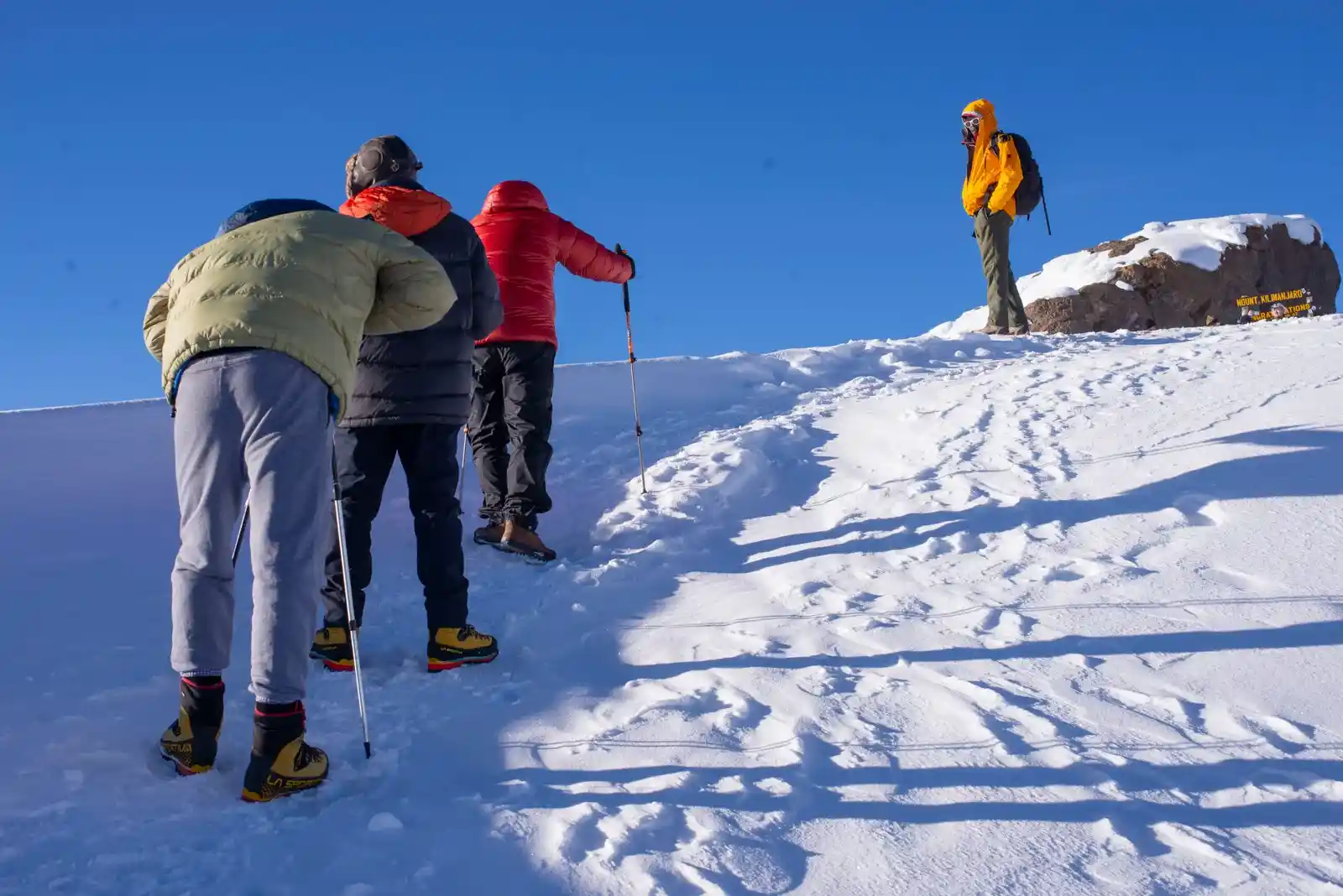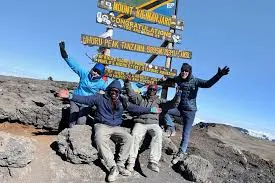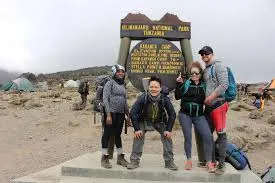Medical Checklists for Kilimanjaro: Health Prep for a Safe Climb
Before you climb Kilimanjaro, taking some medical steps can really help. First, get a full health check-up. Make sure your vaccinations are current, and talk to your doctor about preventing altitude sickness. Pack a personal first-aid kit with medications for headaches, stomach problems, and minor injuries. Staying informed and prepared makes your climb safe and your summit experience enjoyable. With Capable Africa Tours, our detailed medical checklists make sure you’re ready for the 6 to 9-day trek through Kilimanjaro’s different climates, ranging from humid rainforests to the icy summit. We cover everything from vaccinations and fitness training to medications and first-aid kits. Follow our expert guide to stay healthy, prevent altitude sickness, and reach the summit at 19,341 feet safely.
Plan Your Kilimanjaro Trek Now
Why Medical Preparation is Critical for Kilimanjaro
Medical preparation is critical for Kilimanjaro because the high altitude and physical demands can trigger altitude sickness, dehydration, and other health issues. Getting a proper check-up, vaccinations, and carrying a well-stocked first-aid kit ensures you stay safe and enjoy the climb without preventable setbacks. Climbing Kilimanjaro, Africa’s highest peak at 19,341 feet, involves navigating five climate zones and facing risks like altitude sickness, dehydration, and minor injuries. Proper medical preparation reduces these risks and boosts your chances of summiting. Capable Africa Tours emphasizes a structured health checklist to ensure safety and comfort during your 6–9 day trek. Below, we outline essential medical steps, supported by data and expert advice.
Key Medical Checklists for Kilimanjaro
| Category | Action | Timeline | Details |
|---|---|---|---|
| Vaccinations | Consult travel clinic | 6–8 weeks before | Yellow fever (if required), hepatitis A, typhoid, tetanus, malaria prophylaxis |
| Medical Checkup | Visit doctor | 2–3 months before | Assess heart, lungs, and fitness for high-altitude trekking |
| Fitness Training | Start training | 4–6 months before | Cardio, strength, and hikes with 15–20kg backpack |
| Medications | Prepare prescriptions | 1 month before | Diamox, ibuprofen, anti-diarrheal, personal meds |
| First-Aid Kit | Pack personal kit | 1–2 weeks before | Bandages, antiseptic, blister pads, thermometer |
Detailed Medical Checklist
- Vaccinations: Confirm yellow fever vaccination (required if traveling from an endemic area). Recommended: hepatitis A, typhoid, tetanus-diphtheria, and malaria prophylaxis. Visit a travel clinic 6–8 weeks prior.
- Medical Checkup: Schedule a checkup 2–3 months before to evaluate heart, lung, and overall health. Discuss altitude sickness medications like Diamox (acetazolamide).
- Fitness Preparation: Train for 4–6 months with cardio (running, cycling), strength exercises (squats, lunges), and hikes carrying a 15–20kg backpack for 5–10 miles.
- Medications: Pack Diamox (125–250mg daily for altitude sickness), ibuprofen (pain relief), loperamide (anti-diarrheal), and personal prescriptions in original packaging.
- First-Aid Kit: Include bandages, antiseptic wipes, blister pads (e.g., Compeed), scissors, tweezers, and a thermometer. Capable Africa Tours provides group first-aid kits.
- Hydration Gear: Bring a 3-liter hydration bladder or bottles and water purification tablets (e.g., Aquatabs). Aim for 4–5 liters of water daily.
- Health Monitoring: Carry a pulse oximeter to monitor oxygen levels and heart rate, especially above 10,000 feet.
Health Risks on Kilimanjaro
| Risk | Prevalence | Prevention |
|---|---|---|
| Altitude Sickness | 50–75% of climbers | Diamox, slow ascent, hydration |
| Dehydration | 30–40% of climbers | 4–5 liters water daily, purification tablets |
| Blisters | 20–30% of climbers | Proper boots, liner socks, blister pads |
| Hypothermia | 5–10% on summit night | Layered clothing, down jacket, thermal gear |
Why Health Preparation Matters for Kilimanjaro
Climbing Kilimanjaro is physically demanding. Trekkers face altitudes up to 19,341 feet, extreme weather, and long hiking days ranging from 6 to 12 hours. Without proper medical preparation, risks like altitude sickness, dehydration, or infections can threaten your climb. Capable Africa Tours’ medical checklists help you tackle these risks ahead of time. This ensures a safer and more enjoyable trek. Here’s why each checklist item is important.
Key Benefits of Medical Preparation
- Altitude Sickness Prevention: Diamox and slow ascent reduce acute mountain sickness (AMS) risk by 20–30%.
- Infection Protection: Vaccinations lower the risk of diseases like typhoid or hepatitis A, common in remote areas.
- Physical Readiness: Training improves endurance, reducing fatigue-related injuries by up to 25%.
- Emergency Preparedness: A personal first-aid kit ensures quick response to cuts, blisters, or minor ailments.
- Hydration Management: Drinking 4–5 liters daily prevents dehydration, a leading cause of trek failures.
Visualize Your Kilimanjaro Health Prep
Watch this video to learn how Capable Africa Tours guides trekkers through medical preparation for a safe and successful Kilimanjaro climb.
Top Tips for Medical Preparation
To prepare medically for Kilimanjaro, schedule a consultation with a travel doctor to review vaccinations, altitude sickness prevention, and any personal health concerns. Pack a well-stocked first-aid kit, including medications for headaches, stomach issues, and minor injuries. Acclimatize gradually by allowing extra days at higher altitudes when possible, and listen to your body to avoid overexertion. Stay hydrated, get adequate rest, and maintain a balanced diet to support your immune system. Below are the practical tips for medical preparation for your Kilimanjaro climb, designed to cover all essentials for a safe and healthy 6–9 day trek with Capable Africa Tours.
- Visit a Travel Clinic Early: Get vaccinations and malaria prophylaxis 6–8 weeks before departure.
- Train for Altitude: Practice hikes at elevation (if possible) or use a stair climber to simulate ascents.
- Test Medications: Try Diamox at home to check for side effects like tingling or nausea.
- Pack a Pulse Oximeter: Monitor oxygen levels (aim for 85%+ above 10,000 feet) to catch AMS early.
- Use Hydration Systems: A 3-liter hydration bladder makes sipping water easier during long hikes.
- Learn AMS Symptoms: Watch for headaches, nausea, or dizziness, and report to guides immediately.
- Rent Gear if Needed: Capable Africa Tours offers rentals for items like sleeping bags to lighten your load.
Ready to Summit Kilimanjaro Safely?
With Capable Africa Tours, climb Mount Kilimanjaro with confidence, backed by our medical checklists and expert guides. Our tailored itineraries and 98% summit success rate ensure a safe, unforgettable adventure.
- 98% summit success rate with experienced guides
- Comprehensive medical checklists for safety
- Gear rentals for sleeping bags, down jackets, and more
- Customizable routes for all fitness levels
- All-inclusive packages with meals and transfers
Limited spots available for Kilimanjaro treks—book now to secure your safe summit journey!
Plan Your Trek Now


